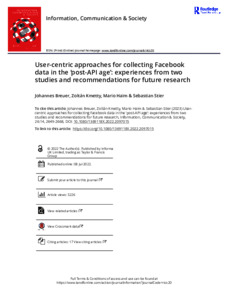|
User-centric approaches for collecting Facebook data in the ‘post-API age’: experiences from two studies and recommendations for future research
Breuer, Johannes
;
Kmetty, Zoltán
;
Haim, Mario
;
Stier, Sebastian
![[img]](https://madoc.bib.uni-mannheim.de/67937/1.hassmallThumbnailVersion/User-centric%20approaches%20for%20collecting%20Facebook%20data%20in%20the%20post-API%20age%20experiences%20from%20two%20studies%20and%20recommendations%20for%20future%20research.pdf)  Vorschau |
|
PDF
User-centric approaches for collecting Facebook data in the post-API age experiences from two studies and recommendations for future research.pdf
- Veröffentlichte Version
Download (2MB)
|
|
DOI:
|
https://doi.org/10.1080/1369118X.2022.2097015
|
|
URL:
|
https://www.tandfonline.com/doi/full/10.1080/13691...
|
|
URN:
|
urn:nbn:de:bsz:180-madoc-679375
|
|
Dokumenttyp:
|
Zeitschriftenartikel
|
|
Erscheinungsjahr:
|
2023
|
|
Titel einer Zeitschrift oder einer Reihe:
|
Information, Communication & Society : ICS
|
|
Band/Volume:
|
26
|
|
Heft/Issue:
|
14
|
|
Seitenbereich:
|
2649-2668
|
|
Ort der Veröffentlichung:
|
London
|
|
Verlag:
|
Routledge
|
|
ISSN:
|
1369-118X , 1468-4462
|
|
Sprache der Veröffentlichung:
|
Englisch
|
|
Einrichtung:
|
Fakultät für Sozialwissenschaften > Computational Social Science (Stier 2023-)
|
|
Bereits vorhandene Lizenz:
|
 Creative Commons Namensnennung 4.0 International (CC BY 4.0) Creative Commons Namensnennung 4.0 International (CC BY 4.0)
|
|
Fachgebiet:
|
070 Nachrichtenmedien, Journalismus, Verlagswesen
|
|
Freie Schlagwörter (Englisch):
|
Facebook , digital trace data , social media , data donation , API
|
|
Abstract:
|
Although other social media platforms have seen a steeper increase in users recently, Facebook is still the social networking site with the largest number of users worldwide. A large number of studies from the social and behavioral sciences have investigated the antecedents, types, and consequences of its use. In addition or as an alternative to self-reports from users, many studies have used data from the platform itself, usually collected via its Application Programming Interfaces (APIs). However, with the drastic reduction of data access via the Facebook APIs following the Cambridge Analytica scandal, this data source has essentially become unavailable to academic researchers. Hence, there is a need for different modes of data access for what Freelon (2018) has called the ‘post-API age’. One promising approach is to directly collaborate with platform users to ask them to share (parts of) their personal Facebook data with researchers. This paper presents experiences from two studies employing such approaches. The first used a browser plugin to unobtrusively observe Facebook use while users are active. The second asked participants to export and share parts of their personal Facebook data archive. While both approaches yield promising insights suitable to extend or replace self-reports, both also entail specific limitations. We discuss and compare the unique advantages and limitations of both approaches and provide a list of recommendations for future research.
|
 | Dieser Eintrag ist Teil der Universitätsbibliographie. |
 | Das Dokument wird vom Publikationsserver der Universitätsbibliothek Mannheim bereitgestellt. |
 Suche Autoren in Suche Autoren in
BASE:
Breuer, Johannes
;
Kmetty, Zoltán
;
Haim, Mario
;
Stier, Sebastian
Google Scholar:
Breuer, Johannes
;
Kmetty, Zoltán
;
Haim, Mario
;
Stier, Sebastian
ORCID:
Breuer, Johannes ; Kmetty, Zoltán ; Haim, Mario ; Stier, Sebastian  ORCID: 0000-0002-1217-5778 ORCID: 0000-0002-1217-5778
Sie haben einen Fehler gefunden? Teilen Sie uns Ihren Korrekturwunsch bitte hier mit: E-Mail
Actions (login required)
 |
Eintrag anzeigen |
|
|
 ORCID: 0000-0002-1217-5778
ORCID: 0000-0002-1217-5778



 Creative Commons Namensnennung 4.0 International (CC BY 4.0)
Creative Commons Namensnennung 4.0 International (CC BY 4.0) Suche Autoren in
Suche Autoren in